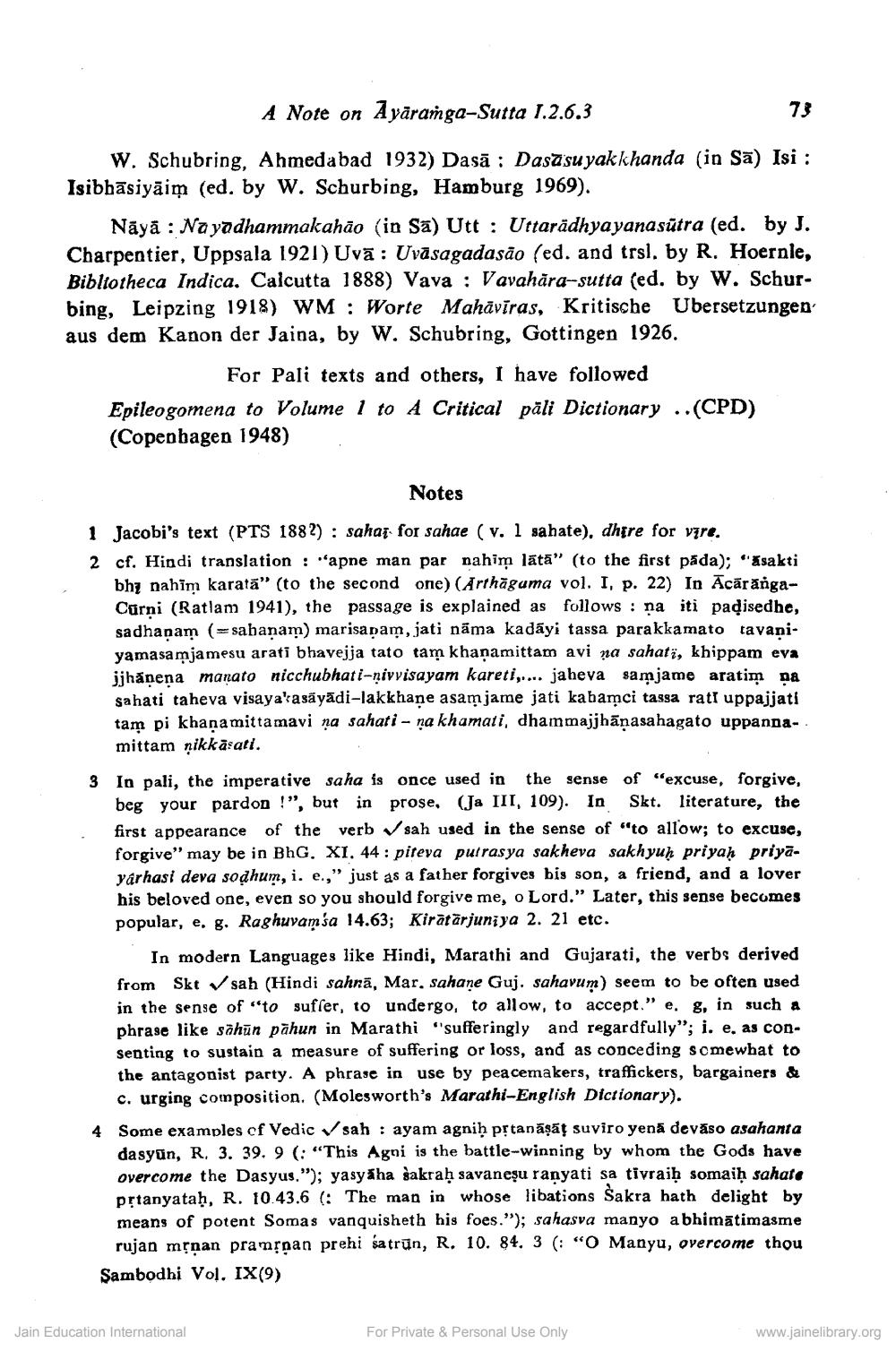________________
A Note on A yāramga-Sutta 1.2.6.3
73
W. Schubring, Ahmedabad 1932) Dasā : Dasā'su yakkhanda (in Sā) Isi : Isibhāsiyāim (ed. by W. Schurbing, Hamburg 1969).
Nāyā : Nayadhammakahão (in Sa) Utt : Uttaradhyayanasūtra (ed. by J. Charpentier, Uppsala 1921) Uvā : Uvāsagadasão (ed. and trsl. by R. Hoernle, Bibliotheca Indica. Calcutta 1888) Vava : Vavahara-sutta (ed. by W. Schurbing, Leipzing 1918) WM: Worte Mahāvīras, Kritische Ubersetzungen aus dem Kanon der Jaina, by W. Schubring, Gottingen 1926.
For Pali texts and others, I have followed Epileogomena to Volume 1 to A Critical pāli Dictionary ..(CPD) (Copenbagen 1948)
Notes
1 Jacobi's text (PTS 1882) : sahaj for sahae (v. 1 sahate), dhưre for vire. 2 cf. Hindi translation : "apne man par nahim lātā” (to the first păda); "Isakti
bhy nahīm karata" (to the second one) (Arthāgama vol. I, p. 22) In AcārăngaCurni (Ratlam 1941), the passage is explained as follows: na iti padisedhe, sadhanam (=sahanam) marisanam,jati nāma kadáyi tassa parakkamato tavaniyamasa mjamesu arati bhavejja tato tam khanamittam avi na sahatë, khippam eva jjhănena manato nicchubhati-nivvisayam kareti,.... jaheva samjame aratim na sahati taheva visaya'asäyādi-lakkhane asam jame jati kabamci tassa rati uppajjati tam pi khanamitta mavi na sahati - na khamati, dhammajjhānasahagato uppannamittam nikkasati.
3 In pali, the imperative saha is once used in the sense of “excuse, forgive,
beg your pardon !”, but in prose, (Ja III, 109). In Skt. literature, the first appearance of the verb sah used in the sense of “to allow; to excuse, forgive" may be in BhG. XI. 44: piteva putrasya sakheva sakhyuh priyaḥ priyayárhasi deva sodhum, i. e.," just as a father forgives bis son, a friend, and a lover his beloved one, even so you should forgive me, o Lord.” Later, this sense becomes popular, e. g. Raghuvamsa 14.63; Kirātārjuniya 2. 21 etc.
In modern Languages like Hindi, Marathi and Gujarati, the verbs derived from Skt sah (Hindi sahnā, Mar, sahane Guj. sahavum) seem to be often used in the sense of "to suffer, to undergo, to allow, to accept." e. 8. in such a phrase like sāhūn pāhun in Marathi "sufferingly and regardfully"; i. e, as consenting to sustain a measure of suffering or loss, and as conceding scmewhat to the antagonist party. A phrase in use by peacemakers, traffickers, bargainers &
c. urging composition. (Molesworth's Marathi-English Dictionary). 4 Some examples of Vedic sah : ayam agnih pitanāşat suviro yenā devāso asahanta
dasyün, R. 3. 39. 9 (: "This Agni is the battle-winning by whom the Gods have overcome the Dasyus."); yasyäha sakraḥ savaneșu ranyati sa tiyraiḥ somaiḥ sahate prtanyataḥ, R. 10.43.6 (: The man in whose libations Šakra hath delight by means of potent Somas vanquisheth his foes."); sahasva manyo abhimātimasme rujan mfnan pramoan prehi satrūn, R. 10. 84, 3 (: “O Manyu, overcome thou Sambodhi Vol. IX(9)
Jain Education International
For Private & Personal Use Only
www.jainelibrary.org




